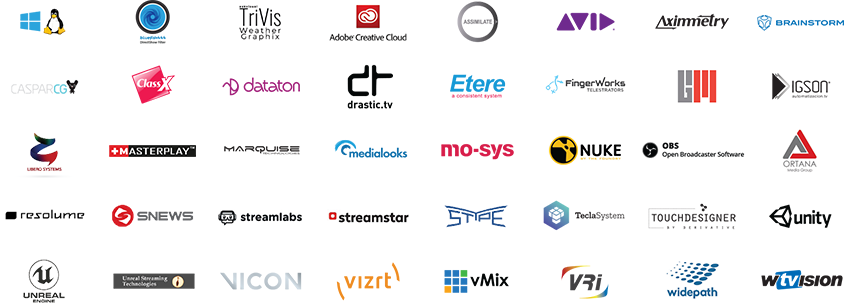KRONOS Optikos3G
Flexible Hybrid IP and SDI Video Card
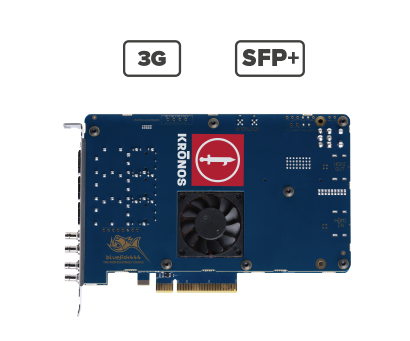
Interchangeable SFP+ Interfaces deliver unparalleled flexibility
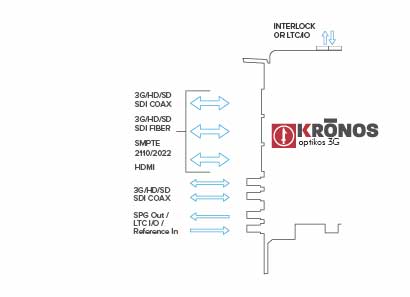
Optikos3G provides unrivaled flexibility and performance with three (3) unpopulated SFP+ Interfaces, allowing custom loading of SFP+ Modules for SDI via COAX or FIBER, SMPTE 21110/2022 IP, and HDMI Video input or output SFP+ Modules. Visit the SFP+ Configurator to see the flexibilty Optikos3G and to configure the perfect custom video interface configuration. As standard Optikos3G provides (2) two dedicated bi-directional 3G SDI HDNBC connections with a high quality Bypass Relay for traditional SDI over Coaxial broadcast workflows.
Watch how the Interchangeable Video Interface works here.
Compare Optikos3G features
| Optikos3G | Optikos3G ST IP | |||
| Bi-Directional SDI (HD-BNC) | 2 | 2 | ||
| 1.5G HD/SD-SDI | 2 | 2 | ||
| 3G-SDI (Level A+B) | 2 | 2 | ||
| Dual Link 1.5G (4:2:2:4/4:4:4:4) |
YES | YES | ||
| Dual Link 3G (Level A+B) | YES | YES | ||
| HDR HFR | YES | YES | ||
| Interchangeable SFP+ Interfaces | 3 | 3 | ||
| Interchangeable SFP+ Modules | 0 (add up to 3)* | 3 | ||
| Module | Stream | Module | Stream | |
| ST2110-20/30/40 | 3* | 6* | 3 | 6 |
| ST2022-6/7 | 3* | 6* | 3 | 6 |
| 3G/1.5G/SD-SDI I/O (HD-BNC) | 3* | 6* | 3* | 6* |
| 3G/1.5G/SD-SDI I/O (Singlemode Fibre) | 3* | 6* | 3* | 6* |
| HD/SD HDMI 1.4a Type D (Micro-HDMI) | 3* | 3* | 3* | 3* |
| LTC In / Out | YES | YES | ||
| Reference In / SPG Out | YES | YES | ||
| Interlocking In / Out | YES | YES | ||
| Embedded audio | YES | YES | ||
| Low-latency hardware keyers | 4 | 4 | ||
| Bypass relays | 1 | 1 | ||
| Colour space converter | YES | YES | ||
| Customisable pixel formats and rasters | YES | YES | ||
| Multi-card support | YES | YES | ||
| Thunderbolt-compatible | YES | YES | ||
| Full-duplex DMA | YES | YES | ||
| VBI, HANC & VANC | YES | YES | ||
| NVIDIA GPUDirect | YES | YES | ||
| AMD DirectGMA | YES | YES | ||
| Stereoscopic/3D imaging | YES | YES | ||
| Range of firmware options | YES | YES | ||
| Optional AUX IO via STEM port | YES | YES | ||
| LTC I/O (HD-BNC), RS-422 (RJ45), AES Audio I/O (DB25) | EX-1 | EX-1 | ||
| Analogue Audio I/O (2 x 3.5mm TRS), RS-422 (RJ45), AES Audio I/O (DB25) | EX-2 | EX-2 | ||
*Requires optional SFP+ modules.
Optional Connectivity
Optional auxiliary I/O can be added to KRONOS cards via the STEM port interface and optional EX-1 and EX-2 products. EX-3 provides dedicated LTC via Interlock IO.

Part No. K4102
KRONOS Optikos3G


Part No. EX2


Part No. EX1


Part No. EX3

4 x Low-latency video keyers
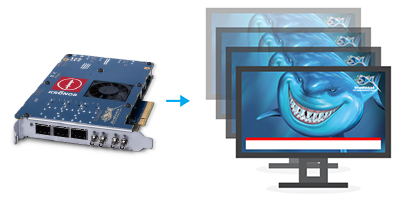
Optikos3G has four (4) low-latency hardware video keyers, allowing video layers to be combined in hardware with microseconds of delay. This feature allows animated logos, captions, tickers, etc. to be keyed over live video feeds at full 12-bit precision and with minimum input to output delay. Additional SFP+ Modules are required to utilise all Low Latency Keyers.
DMA features
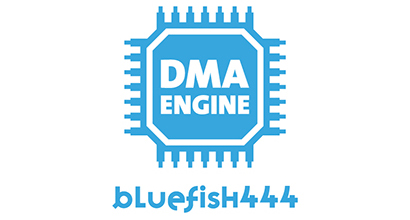
The industry's lowest-latency I/O, by design
Optikos3G has, by design, the world's lowest-latency providing access to captured fields or frames to on-board card memory even before the whole field or frame is complete, thereby reducing the latency to sub one field or frame. During a capture or playout, each process can occur at less than or equal to 1 field for interlaced modes, and less than 1 frame for progressive modes.
Low-latency framestores
Optikos3G firmware and driver architecture provides I/O framestores with predictable and short propagation delays enabling the lowest possible latency through the card. The Bluefish444 SDK supports Auto-Capture enabling access to the video field or frame even before the video field/frame has been fully captured. This low-level access to video and audio data provides maximum control over video and audio synchronisation.
FIFO mode protection
Optikos3G firmware and driver architecture supports a FIFO mode that can be utilised for buffering I/O framestores, ensuring that no field/frame will ever be dropped. The FIFO architecture can be used to increase or decrease the I/O latency to a fixed value.
Full-duplex asynchronous DMA engine
Optikos3G developers have full control over the heavily optimised DMA engine via the Bluefish444 SDK. The DMA engine supports full-duplex transfers to and from each of 8 video channels at the maximum available PCIe bandwidth.
The DMA engine can independently transfer video and ancillary data and has a selective DMA feature for the transfer of customisable portions of a video field or frame.
Complete access to ancillary data
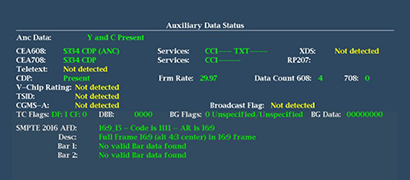
Optikos3G allows full read and write access to the VBI for standard definition SDI video signals. In high definition SDI signals, read and write access is available for HANC and VANC data allowing AFD, KLV, closed caption data and more. Optional SMPTE 2110 supports Audio and Ancillary Timecode through ST2110-30 and ST2110-40.
The industry’s lowest SDI jitter, by design
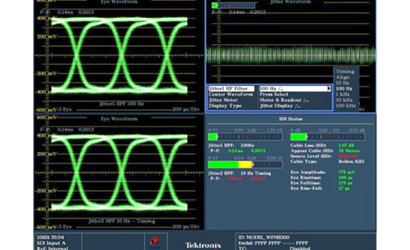
Building on 25+ years of Bluefish444 innovative hardware development, Optikos3G SDI jitter circuit design surpasses the industry’s minimum standard for jitter and eye pattern measurements by almost twice the permitted tolerance.
High quality 3G/HD SDI bypass relay
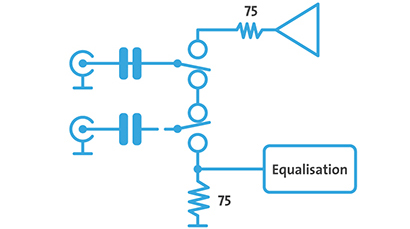
Optikos3G features a single high quality 3G/HD/SD SDI bypass relay, allowing critical on-air systems to manage system failures, power outages, and other unforeseeable circumstances that can be encountered in the world of live broadcast systems.
MR2 Master Routing Resource
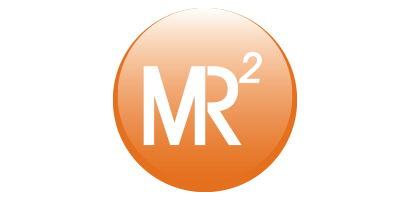
The MR2, Master Routing Resource, within Optikos3G, enables a user to flexibly configure main and preview outputs to suit individual workflows. The Master Routing Resource acts like a telephone exchange for super connectivity. Allowing video from IP, SDI or host workstation to be routed to any or all of the outputs simultaneously.
Maintaining a 12-bit processing pipeline
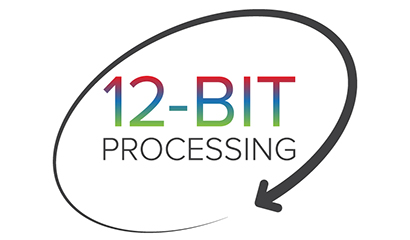
A 12-bit image processing pipeline is standard within Optikos3G. This allows 8, 10 & 12-bit SDI video signals to be produced from 8, 10, 12 & 16-bit pixel formats providing the highest image quality available from your source material. A 12-bit image pipe means that 4096 discrete values of red, green & blue are maintained per-pixel; that’s 4 times the colour precision of a traditional 10-bit processing pipeline!
HDR HFR
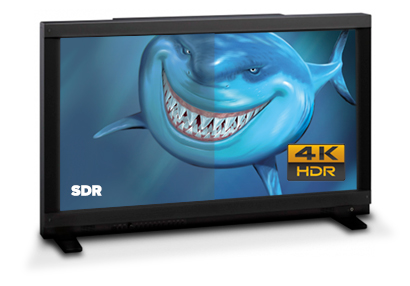
Optikos3G features (2) two bi-directional 3G SDI interfaces allowing multi-channel capture or playout. HDR/SDR workflows are supported for capture and playout of multiple channels of 2K/HD High Dynamic Range content. Adding up to 3 the optional SFP+ modules enables HDR IO for UHD SDI via COAX or FIBER, SMPTE 2110/2022, and HDMI video interfaces, configure your custom video interface at the SFP+ Configurator.
Maintaining the highest quality RGB <=> YUV
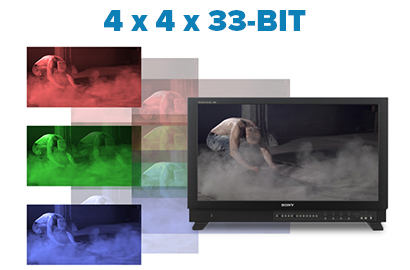
Colour space conversion image processing includes a fully programmable 4 x 4 x 33-bit colour matrix providing the highest quality colour space conversions that are a standard requirement in professional video workflows. The fully programmable 4 x 4 x 33-bit colour matrix reduces colour space conversion errors and ensures the highest quality colour accuracy during capture, monitoring and mastering.
Pseudo Sync Pulse Generator (SPG)
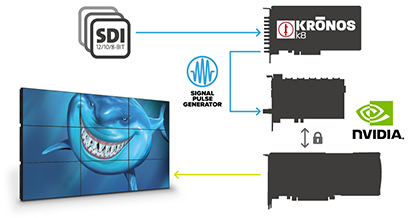
Bluefish’s integrated pseudo Sync Pulse Generator (SPG) in the Optikos3G video card provides stable and accurate synchronisation with other Professional AV equipment, including additional KRONOS or Epoch video cards, cameras, monitors or QC equipment.
The SPG output generates a Bi-level sync signal or a Pseudo Sync, Tri-level compatible sync signal.
The Optikos3G can be connected with the NVIDIA Quadro Sync card and Quadro GPU to lock the SDI and GPU display systems together via the SPG in ways that would not otherwise be achievable.
BlueToolBox & BlueSigGen tools for developers
Watch the BlueToolBox acquisition & playout duplication and routing videos here and here.
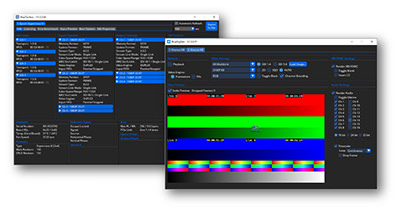
The Bluefish SDK ships with a number of useful tools for developers to streamline integration and allow for easy troubleshooting.
BlueToolBox provides important card information including the card state, input and output video modes, DMA settings and more. BlueSigGen gives developers the ability to send out test signals in any video mode, so that validating multiple formats is quick and easy.
An extensive set of sample applications and interfaces are provided making integration of Bluefish hardware into applications and systems extremely efficient.
Single system multi-card support
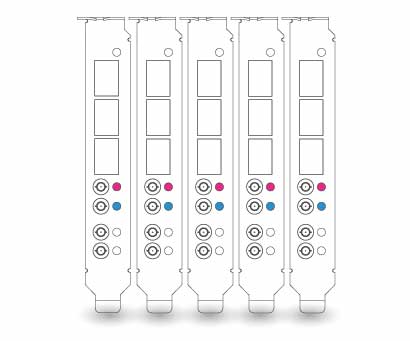
The Bluefish444 SDK provides unrestricted integration of multiple Optikos3G video cards per-system. Optikos3G features an internal interlock system, allowing cards to generate a proprietary interlocking signal which will sync lock additional KRONOS or Epoch | 4K Neutron cards when connected to the internal interlock connector.
Thunderbolt expansion chassis compatibility
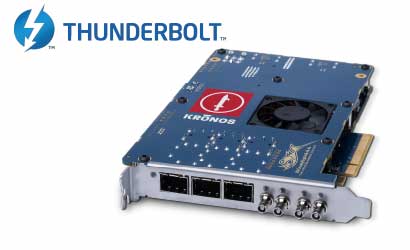
Popular PCI Express and Thunderbolt expansion chassis' are designed to be light and portable, and Optikos3G is compatible with most PCIe expansion devices from those featuring a single slot right through to much larger multi-slot devices.
For the full list of qualified third-party chassis' visit Bluefish444 Certified Solutions page.
Access a unified API across Windows & Linux
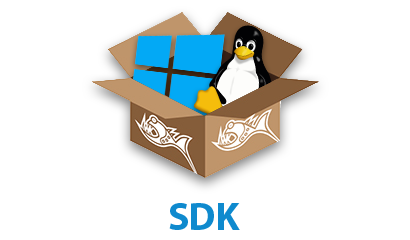
The Bluefish444 cross-platform SDK provides rapid distribution across Windows, and Linux operating systems and delivers a unified driver for all models of Bluefish444 hardware.
Optikos3G is compatible with DirectShow filters, the Medialooks MPlatform SDK for Windows offering advanced features like multi-channel SMPTE IP, SDI, multi-card I/O and Interchangable SFP+ Interfaces.
Optikos3G supports AMD DirectGMA and NVIDIA GPUDirect in order to reduce memory bandwidth and latency for processing video data on the GPU.
Cross-platform support with industry-leading 3rd-party software
Optikos3G leverages two decades of Bluefish444 software development. It is compatible with industry-leading software developed by Bluefish444 and by 3rd-party developers using our Windows, and Linux Software Development Kit. Strong partnerships with companies like Epic Games , Adobe, Avid, ASSIMILATE, NVIDIA, AMD and many more, allow Bluefish444 to deliver hardware, drivers and software plug-ins for the creative industry.
For a full list of compatible software, visit the software section.
